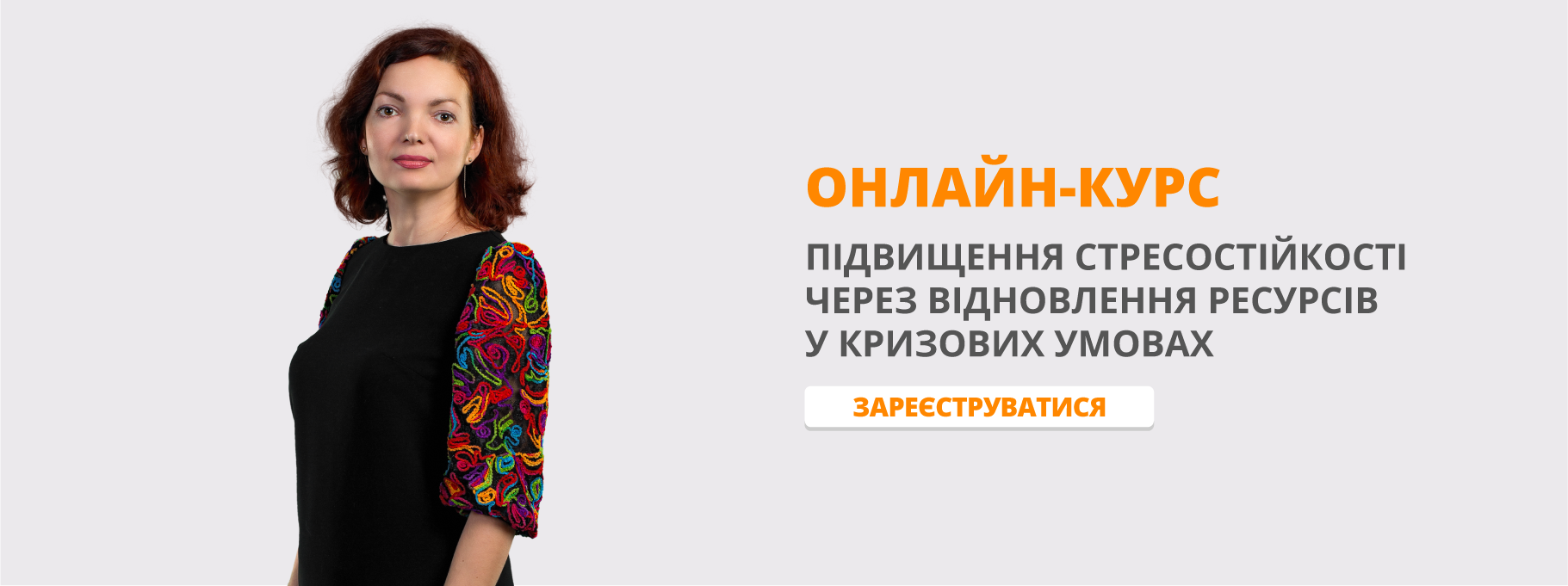English Language is Fun
Анотація:
Сучасний вчитель покликаний спонукати здобувачів освіти до вивчення іноземної мови шляхом використання цікавих і результативних форм взаємодії. Тому використання розробки «English Language is Fun» буде доцільним у роботі з учнями середньої ланки, оскільки вона сприяє формуванню комунікативної компетентності.
На допомогу вчителям англійської мови.
Відділ освіти Маневицької райдержадміністрації
Загальноосвітня школа І-ІІІ ступенів с.Старий Чорторийськ

Методична розробка
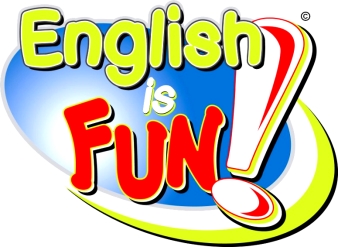
Сльозко Ніна Миколаївна
вчитель англійської мови,
спеціаліст вищої категорії
Маневичі – 2020
![]()
Назва навчально-методичного видання “English Language is Fun”
Тип навчально-методичного видання – методична розробка.
Повна назва навчального закладу - Загальноосвітня школа І-ІІІ ступенів с.Старий Чорторийськ.
Кількість сторінок – 39
Анотація: Сучасний вчитель покликаний спонукати здобувачів освіти до вивчення іноземної мови шляхом використання цікавих і результативних форм взаємодії.Тому використання розробки «English Language is Fun» буде доцільним у роботі з учнями середньої ланки, оскільки вона сприяє формуванню комунікативної компетентності.
На допомогу вчителям англійської мови.
Укладач
Сльозко Ніна Миколаївна – вчитель англійської мови
Рецензент
Демчук Олена Миколаївна – методист районного відділу освіти Маневицької РДА.
Навчально-методичне видання затверджено радою методичного кабінету відділу освіти Маневицької РДА, протокол №2 від 21.01.2020 року.
Зміст
Вступ…………………………………….…………………………………………. 4 –5
English Language is Fun……..……………………………………………………...6-22
Додатки Матеріали презентації ……………………………………………………...…….23-38
Використані джерела………………………………………………………………….39
Вступ
Значення англійської мови в сучасному суспільстві
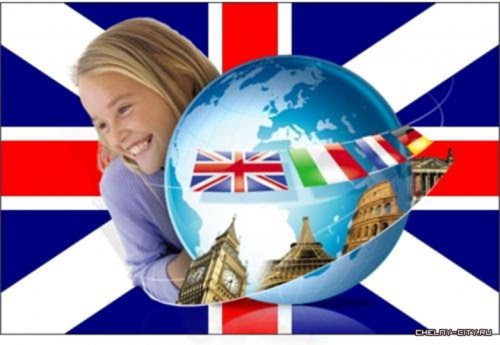
В світі існує безліч країн, а мов, якими розмовляють їх жителі, ще більше. Як же населенню Землі зрозуміти один одного? Для цього існують міжнародні мови, які і дають змогу всім нам спілкуватися, незалежно від національності та місця проживання. Однією з міжнародних мов є англійська. Значення англійської мови в сучасному світі важко переоцінити. Адже не можна не зважати на вибір більше 1 мільярда людей, які її використовують. І якщо для половини з них вона є рідною, то близько 600 мільйонів вибрали саме її як іноземну.
Яку ж роль в нашому житті зараз відіграє англійська мова? В цілому, політичне, економічне, наукове, спортивне життя всього світу «протікає» англійською мовою. Всілякі саміти і зустрічі глав держав, підписання указів, дебати – все це проводиться англійською мовою. Міжнародна торгівля, робота банківської системи, діяльність транспортної системи здійснюється англійською мовою. Міжнародні конференції, вивчення світового досвіду та обмін інформацією відбувається лише з використанням англійської мови. Та що там говорити – олімпійські ігри і всілякі змагання між країнами вибрали офіційною мовою саме англійську. Ми ще не враховували кіноіндустрію та музичний олімп. Фільми американського виробництва міцно увійшли в наше життя, а будь-який поп-виконавець вважає престижним заспівати не менше однієї пісні англійською мовою.
Значення англійської мови в сучасному світі настільки велике, що її знання не є розкішшю. Її вчать скрізь: у школах, університетах, на курсах. Будь-яка освічена людина просто зобов'язана володіти англійською мовою, тому що саме вона є ключем до подальшої самоосвіти та самовдосконалення. Хочете подорожувати і не відчувати себе білою вороною, а вільно спілкуватися з людьми різних національностей? Хочете стати студентом закордонного університету? Хочете престижну роботу з просуванням по кар'єрних сходах? А, може, ви бажаєте працювати за кордоном? Порада одна – вивчайте англійську мову!!!
Знання англійської мови в сучасному світі є своєрідним вікном у світ. Володіючи цією мовою міжнародного спілкування, ви зможете досягти поставлених цілей за допомогою нових можливостей. І обов'язково зрозумієте, що значення англійської мови не перебільшено!
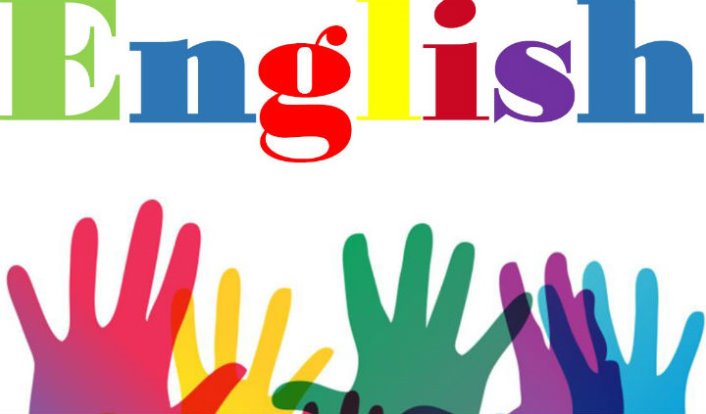
English Language is Fun
Мета: виховувати інтерес до опанування іноземної мови, удосконалювати навички розуміння на слух та говоріння; ознайомити учнів із традиціями і звичаями країни, мову якої вивчають; розвивати в учнів інтерес до творчості; стимулювати зацікавленість, комунікативно-пізнавальну діяльність; розвивати мовленнєву здогадку, логічне мислення. Розширювати іншомовну лексичну компетенцію. Виховувати інтерес до культури інших країн. Виховувати почуття прекрасного, доброту і милосердя до людей.
Обладнання: костюми, декорації, музичний супровід, комп’ютер, проектор, презентація «Christmas traditions and customs in Great Britain», проекти, прапорці.
Контингент учнів: 3,7,10,11 класи.
Хід заходу
Compere. Good morning dear teachers, pupils and guests! I’m glad to meet you!
I’m a journalist from Great Britain. I have read in facebook that it will be a party “English Language is Fun” at your school. And I decided to visit your party. I have known many foreign languages but I like English best of all. I will be a compere at your party.
- Let’s begin our excursion. (Торкається завіси, відкривається сцена, де в центрі сидять діти з іграшками). Hello friends! How are you?
Pupils 1-6. We are fine.
Compere. I like to travel around the world, and you?
Pupils 1-6. We love, too and we love English!
Compere. What can you do?
Pupil 1. I can jump like a frog, jump., jump.
I can swim like a fish, swim, swim.
Pupil 2. I can run as a dog, run, run.
I can fly like a bird, fly, fly.
Pupil 3. I can read, I can write,
I can speak English too,
I like learning English
And what about you?
Pupil 4. The boys are handsome
The girls are pretty
We all are clever
And very witty
Pupil 5. We like to study
We like to rest
We all are happy
We are the best.
Pupil 6. I love going to school
I’m learning to write
And I’m learning to spell
And my teacher says
That I am doing very well.
Pupil 7. I can ski and I can skate
I can sledge and make a snowman
We can dance and we can sing.
A Happy Song
If you’re happy and you know it, clap your hands!
(Clap)-(clap)
If you’re happy and you know it, clap your hands!
(Clap)-(clap)
If you’re happy and you know it, and you really want to show it
If you’re happy and you know it, clap your hands!
(Clap)-(clap)
If you’re happy and you know it, stamp your feet!
(Stamp)-(stamp)
If you’re happy and you know it, stamp your feet!
(Stamp)-(stamp)
If you’re happy and you know it, and you really want to show it,
If you’re happy and you know it, stamp your feet!
(Stamp)-(stamp)
If you’re happy and you know it, slap your kness!
(Slap)-(slap)
If you’re happy and you know it, slap your kness!
(Slap)-(slap)
If you’re happy and you know it, and you really want to show it,
If you’re happy and you know it, slap your kness!
(Slap)-(slap)
If you’re happy and you know it, snap your fingers!
(Snap)-(snap)
If you’re happy and you know it, snap your fingers!
(Snap)-(snap)
If you’re happy and you know it, and you really want to show it,
If you’re happy and you know it, snap your fingers!
(Snap)-(snap)
If you’re happy and you know it, do all four!
(Clap)-(clap), (stamp)-(stamp), (slap)-(slap), (snap)-(snap),
If you’re happy and you know it, do all four!
(Clap)-(clap), (stamp)-(stamp), (slap)-(slap), (snap)-(snap),
If you’re happy and you know it, and you really want to show it,
If you’re happy and you know it, do all four!
(Clap)-(clap), (stamp)-(stamp), (slap)-(slap), (snap)-(snap)
Pupil 8. We can play. We like fairy-tales. I have got a pretty doll. Her name is
Cinderella
Compere. Very nice. You are so smart. I have learned from Internet that pupils in
this school like “Cinderella”. Let’s see.
“Cinderella”
(Попелюшка підмітає підлогу. Входить мачу¬ха, яка розмовляє по телефону.)
Stepmother (говорить по телефону). Oh! Yes! Thank you! (Звертається до дочок) Girls! There will be a disco at the Queen's palace. The Queen invites all young ladies to come.
Stepsisters. Wow!
Stepsister 1. Cinderella, give me, my new dress!
Cinderella. Here you are.
Stepsister 2. Bring me my mirror!
Cinderella. Here you are.
Stepmother. Cinderella, give me, my hat! (Попелюшка подає їй капелюх)
Stepsister 1. Tell me, Cinderella, do you want to go to the disco?
Cinderella. Don't laugh at me! Nobody will let me in.»
Stepsister 2. You are too dirty to go there! (Попелюшка плаче. З'являється фея.)
Fairy. Why are you crying about, my child?
Cinderella. I want to go to the Queen's disco. But I have neither new and modern clothes, nor shoes trainers.
Fairy. My dear. I can help you. Here is your dress and shoes. (Приносить.)
(Попелюшка щасливо кружляє.)
Fairy. But remember, you must go home at 12 o' clock.
Cinderella. Thank you very much!
(Бал у королівському палаці. Танець учнів 10 класів. Позаду танцюючих, сестри намага¬ються красиво танцювати. З'являється Попе¬люшка. Принц зачарований іде до неї. Перед ним з'являються сестри.)
Prince. Who is that beautiful girl?
Stepsister 1. I don't know (злиться).
Stepsister 2. Maybe she is from another country? (Відходить)
Prince. Hello!
Cinderella. Hello! My name is Cinderella.
Prince. What is your favourite song?
Cinderella. I like nice songs very much.
Prince. Do you like song “ Yesterday”?
Cinderella. Oh, it is one of the most popular hits by the Beatles. I like it.
Prince. Today the Beatles are as popular as many years ago. It’s my present for you.
Listen, please. ( Учениця 10 класу виконує пісню “Yesterday”.
Yesterday,
All my troubles seemed so far away
Now it looks as though they're here to stay
Oh, I believe in yesterday
Suddenly,
I'm not half the man I used to be
There's a shadow hanging over me
Oh, yesterday came suddenly
Why she had to go I don't know,
She wouldn't say
I said something wrong,
Now I long for yesterday
Yesterday,
Love was such an easy game to play
Now I need a place to hide away
Oh, I believe in yesterday
Why she had to go I don't know,
She wouldn't say
I said something wrong,
Now I long for yesterday
Yesterday,
Love was such an easy game to play
Now I need a place to hide away
Oh, I believe in yesterday
(Щасливий принц підходить до Попелюшки. Чути удари годинника)
Cinderella. Oh. It’s twelve o’clock. I’m sorry, but I must go now. (Побігла)
Prince. (Біжить за нею). Oh. No. But it's not a problem. I can find her in Kontakts.
Compere. Internet gives great possibilities don’t only for us but even in a fairy tale
for prince.
І know that children at your school like their teachers and lessons very much.
They are patriots of their school and patriots of their country.
(Виходять учні 7 класу)
Pupil 1. І like my school
It's so cool
Pupils are friendly
Teachers speak gently
I like to study
At such a school
And I feel here very cool!
Pupil 2. The ink is black
The page is white
Together we learn to read and write
Every child can understand
Ukraine is our Motherland.
Pupil 3. We live in Ukraine a beautiful land,
It’s home for me, and you, my friend
It’s towns and villages are so nice
Ukrainian people are friendly and wise.
Pupil 4. Blue sky and yellow field of grain
Is on the flag of my Ukraine
It’s emblem speak to all the world
With Freedom – such a lovely word
Bread-salt will give to a friendly guest.
Ukrainian people without request.
Pupil 5. Love your dear Motherland
Love it with your whole heart
Love Ukraine when the days are happy
Love it when they are dark
Pupil 6. Cherish your mother tongue
Cherish your family root
Never stop thinking of your parents
And make their life good.
Pupil 7. You can go to the East
You can go to the West
But at home it is better
But at home it’s the best
Compere. I am sure you really love your native country and you want to live in
peace and friendship. You have known a lot of interesting poems about your country.
Compere. I know that you have prepared project works and presentation about
Christmas traditions and customs in Great Britain. Please show your
presentation.
(Pupils of the tenth form show their presentation about Christmas
traditions and customs)
Pupil 1. Christmas in Great Britain
Every nation and every country has its own cus¬toms and traditions. In Britain traditions play more important part in the life of the people than in some other countries. Christmas Day, December 25, is probably the most popular ho¬liday in Great Britain. Preparations for Christ¬mas are always pleasant: buying gifts, sending Christmas cards and decorating the tree with small, brightly-coloured lights, shining balls, tinsel, toys. The first lighting of the tree signifies the official opening of the Christmas season.
Besides the Christmas tree, holly and mistletoe are used to decorate the house. Holly is an ever¬green plant with sharp-pointed leaves and red berries. Branches of holly are put up behind pic¬tures and mistletoe is hung over doors, so the young people have a chance to kiss the girls un¬der it, plucking each time a red berry from the mistletoe. It is said that the girl who was not kissed under it at Christmas would not get married that year.
In the evening of the 24th of December children - hang their Christmas stockings on their beds or fireplaces. Christmas stocking is not a real one. It is big and beautifully decorated. Father Christmas (Santa Claus) put presents into them: sweets, nuts and if the child didn't behave prop¬erly Santa Claus can put there a piece of coal as punishment.
Every English family sends and receives many Christmas cards. Traditionally there is a robin on almost every card. You can read on the card: "Merry Christmas".
Waits are a group of singers who sing carols They receive money for their singing and playing They give the money to poor and old people at church. Carol singing is an essential part of Christmas. Carols may be traditional or with some varia¬tions that express different feelings.
Christmas day people celebrate with big dinners. A big roast turkey is usually followed by Christmas pudding. It is the highlight of the dinner. Some people cook it months before Christmas. A lot of families have their own Christmas pudding reci¬pes. A real Christmas pudding always has a-piece of holly on the top and a coin is put inside for good luck. The dinner ends with mince pies. Crackers are also usual at Christmas dinner. A cracker con¬tains a small toy and a joke. After the dinner they go to the sitting room to listen to the Christmas speech of the Queen shown on TV
26th December is also a public holiday, Boxing Day, which takes its name from a former custom of giving a Christmas box with presents to ser¬vants and poor people. So, Christmas is a merry family holiday for all the people of Great Bri-tain. Christmas comes but once a year, but when it comes, it brings good cheer.
Pupil 2. Who is JESUS CHRIST
Christmas is a Christian festival that celebrates the birth of Jesus. It is the most popular festival of the year in Great Britain and is widely celebrated all over the country.
On Christmas Day the bells ring. Their ringing sends forth messages of peace and love. They ring so merrily wishing everybody: “Merry Christmas! Merry Christmas! May our hearts overflow with joy on the birthday of our Lord!” The bells make each heart turn from the word’s caprice and bow before the feet of our Heavenly Lord.
The story of the birth of Jesus Christ is found in the New Testament of the Bible. He was the son of God who came into the world to save people.
Christmas is a religious festival, and there are always special Christmas services in churches and chapels to celebrate it. Christmas carols celebrate the birth of Christ and tell the story of Christmas.
Pupil 1. CHRISTMAS GREENERY
The Christmas holiday would be far less fes¬tive without Christmas trees, holly, and mistletoe to brighten up the scene — and each of these Christmas decorations has a fascinating history behind its use.
Mistletoe
In Great Britain more than 2,000 years ago, the pagan Druids thought mistletoe was a sacred plant. Today kissing under the mistletoe is supposed to bring good luck. This custom began in Scandinavia.
Holly
According to a legend, the crown of thorns that Christ wore was made of holly. His blood flowing over the holly berries turned them from white to red.
Christmas Trees
Evergreens have long been thought of a symbo¬lizing life because they keep their leaves all through the year. Pagan people brought evergreen branches indoors to celebrate a festival. The custom of putting up and decorating trees may have started in Germany when Martin Luther saw the stars shining above a pine tree on Christmas Eve, and put up a tree of his own, decorated with candles.
Pupil 2. CAROL SINGING
Christmas has had its own music and songs since it started. But the Christmas carol has a special his¬tory. The word "carol" means "circle dance". Among many ancient people carolling was common at festi¬vals. Groups would dance arm-in-arm, often singing simple, happy songs. Carols became a natural way for Christians to express their joy at Christmas.
Christmas carols were known in England by the year 1100. St. Francis of Assini, who lived in Italy about 800 years ago, encouraged the singing of Christ¬mas carols. He is sometimes called the father of the Christmas Carol.
Nowadays no church or school is without its carol service. Carols may be traditional or by known compos¬ers, or new arrangements of old tunes; they can express a wide range of feelings. In small towns and villages one may still see carol-singers who come and stand in front of the house and sing or play Christmas carols. They expect a few pennies in return for their musical effort.
Here is one of the most famous carols "We wish you a Merry Christmas" .
We wish you a Merry Christmas
and a Happy New Year!
Good tidings we bring
To you and your kin.
We wish you a Merry Christmas
And a happy New Year!
Repeat
We all want some figgy pudding'
So bring some right here Good tiding we bring...
Repeat
We won't go until we get some,
So bring some right here Good tiding we bring...
Pupil 1. CHRISTMAS CARDS
Christmas cards are now an essential part of the Christmas festivities. First they appeared more than a hundred years ago. William Egley, an English artist, designed his own card in 1842 and sent it to one hund¬red of his friends. In 1846 a pictorial card designed by J. C. Horsley was published and about a thousand co¬pies were sold. By 1870 the Christmas card had become really popular in England.
The designs have varied in the course of a centu¬ry. But some have remained constant until now — the Christmas robin, holly, mistletoe, scenes from the Bible.
Inside a Christmas card you are sure to find Christ¬mas greetings like these:
1. Hope and love
and peace abide
in every heart
at CHRISTMAS tide.
2. Best Wishes for CHRISTMAS
and every Good Wish
for the Coming Year
3. Wishing you
The blessing of peace,
The beauty of hope... And
the spirit of love
That is CHRISTMAS
4. The nicests part of CHRISTMAS
for remembering people
WhoMake the world A happier place
By their friendship All year through Happy CHRISTMAS
5. It would't seem like CHRISTMAS
Without a wish or two
Sent warmly and Suncerely To SPECIAL FOLKS Like YOU
6. Hope CHRISTMAS brings all
of you just what it should — everything happy
and everything good! HAPPY HOLIDAYS
7. May GOD who SENT his only SON
At Christmas from above
Bring everlasting PEACE AND JOY
To you and those you love
Pupil 2. CHRISTMAS STOCKINGS
It is a traditional custom in their English-speaking countries for children to hang stockings at the foot of the beds on Christmas Eve for Father Christmas, who is supposed to come down the chimney and fill them with presents.
Every year almost a quarter of a million children post letters addressed to Father Christmas, telling him what presents they would like to have. The Post Office delivers the letters to a special office in Scotland and children get a reply on a printed card postmarked Rein-deerland.
Father Christmas will come down the chimney, having parked the reindeer on the roof, and fill the stockings. A carrot should also be left on the mantel¬piece for the reindeer.
Pupil 1. CHRISTMAS DRESS
You know that everybody tries to put on something new for Christmas. This is an ancient custom. It is generally supposed that people do this to express their happi- ness. New clothes is a proper thing for a festive occasion. But there are some other explanations of this habit.
There is a legend, that is 100-200 years old, which says that you must get a new garment to wear for Christmas not to get caught by the Christmas Cat. The Christmas Cat was supposed to be some kind of a monster that originally came from a nordic country. But still today they talk about it and make sure that every one has something new to wear on Christmas.
Pupil 2. CHRISTMAS FOOD
Christmas food has changed relatively recently. Be¬fore the 16th century the Christmas dinner would have been a boar's head followed by roast peacock. It was not until sailors came back from the New World bringing with them a strange-looking bird from Mexico that tur¬key became the traditional British Christmas dinner.
Other Christmas foods need explaining. Mince pies today are not made from meat as they once were, but contain raisins, currants, sugar and apples. Nor does the great British plum pudding contain plums. Now the ingredients are currants, raisins, sultanas, eggs, spices and suet. Some families make the pudding-a year be¬fore they intend to eat it. Believe it or not, it tastes bet¬ter this way. They put coins into the mixture as well.
The lucky eater finds a sixpence, the unlucky eater swallows it!
The traditional Christmas meal consists also of bread sauce, boiled ham, mashed potatoes and Brussel sprouts to be followed by brandy butter and either tea or coffee.
Pupil 1. The Real Saint Nicholas
In England St. Nicholas Day is celebrated on the sixth of December.
Saint Nicholas is the patron saint of just about eve¬rything. He is the national saint of Russia and Greece and churches named after him number in the thou-sands — more than 400 in Great Britain alone. He is the patron saint of judges, murderers, pawnbrokers, thieves, merchants, paupers, scholars, sailors, bakers, travellers, maidens and poor children. He is known as the friend and protector of all those in trouble.
Saint Nicholas was born in the Middle East about 350 miles northwest of Bethlehem in the fourth cen¬tury. He grew up to become the bishop of Myra (now Kale), in his hometown, Lycia, near the coast of what is now Turkey. Legends tell of his love for children, his kindness and the miracles he brought about.
His generosity towards the poor was legendary and he was fond of children. So he became the patron of children. He came very late when the children sleep and puts different presents into their stokings and under the Christmas tree.
In Christian world St. Nicholas is perhaps the most popular and attractive saint.
Pupil 2. Santa Claus
Santa Claus comes down every chimney and fills the slockings which children leave at their beds, fire – place, but in Ukraine they run to the New Year Tree and look for their presents under it. They are very thankful Santa Claus and of course, the sing joyful songs.
Santa Claus lives in the North and drives in a deer drawn sleigh loaded with toys and present for all children.
In Great Britain there is a nice tradition to write letters to Santa Claus. But you mustn’t put this into the mail-box, but into the fire place. The air highs, the smoke goes up the chimney and the Santa Claus reads them and realizes all children’s wishes.
Compere. I like your project works, your presentation and preparation for the party.
Thanks everybody.
Now I have some statements about Ukrainian and English Christmas. Your task is to say if it is Ukrainian or English Christmas. Pupils of the seventh form come here, please. (Використовуємо англійські і українські прапорці, що отримали учні).
1. Father Christmas puts children’s presents under the New Year Tree.
2. Christmas is on the seventh of January.
3. Christmas is on the 25th of December.
4. The main dish of the Holly Supper is Kutia – porridge with honey, poppy – seeds and nuts.
5. People decorate their homes, with holly, mistletoe and other evergreens.
6. The main dish of the Holly Supper is turkey.
7. Father Christmas puts children’s presents into their stockings by the fireplace.
8. “ We wish you a Merry Christmas” is one of the most famous carols.
Compere. I have known that there are carol-singers at your school. Please, sing a Christmas carol. (Учні співають колядку “We wish you a Merry Christmas”)
Compere. You have worked very well.
You found much interesting information about Christmas traditions and customs in Great Britain. You must remember English proverb “ I heard and forgot, I saw and remembered” ( Я почув і забув, я побачив – і запам’ятав). Can you tell me is it important to learm English language?
Poems about English language
Poems 1. English is wonderful
English is great
We can travel to England
By plane or by train
We should speak it well
To make many friends
And to write e-mail.
Poems 2. Learning English is fun
Learning English is a hard work
Learning English is a way to speak to read, to write
Learning English helps to play computer game.
Poems 3. Don’t put English language to the wardrobe
It need a golden cup
Please drink it completely to the end
With entering the English club.
Poems 4. I met a little girl
Who came from another land
I couldn’t speak her language
But I took her by the hand
We danced together
Had such fun
Dancing is a language
You can speak with anyone.
Poems 5. Learning English is so nice
Learning English is so good
If you are learning English,
You will know what is peace
You will know what is friendship
You will know what is freedom
You will know what is happiness
If you are learning English
Your knowledge will be big!
You will be wise and clever,
You will be nicer than ever,
And, of course, your mood
Will be always good!
Teacher. I say Thank You today to all who prepared this party. Thank you very much for your participation in the party.
Dear teachers, pupils and quests! On the eve of New Year and Christmas we congratulate you with the coming holidays and wish you to enjoy the beauty of nature around you, the depth and warmth of human souls and hearts, an active and creative work and lots of happiness. Warmest wishes for a Happy Holiday Season.
Pupils. Our dear teaches
We love you so much
We want you to be happy
Every day, every year, forever.
Cod Bless you all for today and forever!
(Учні виконують пісню “May there always be sunshine”)
Compere. I want to thank you and wish you creative work and peace in Ukraine.
Додатки
Матеріали презентації
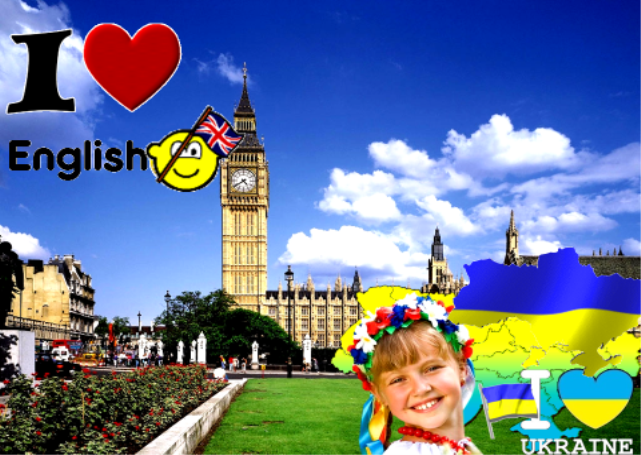
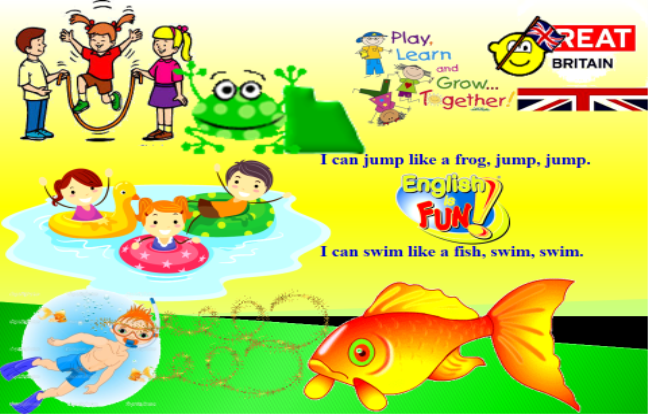
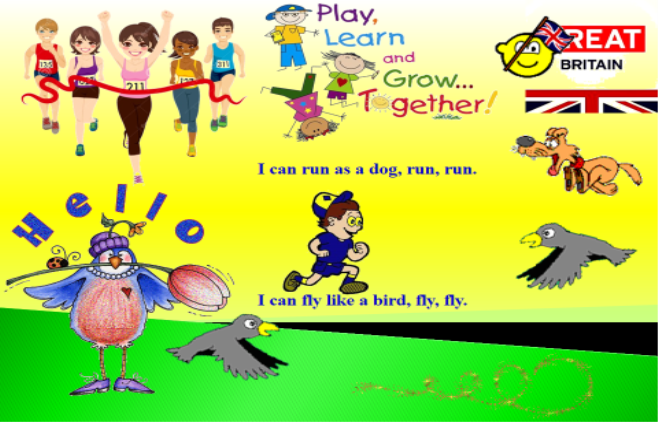
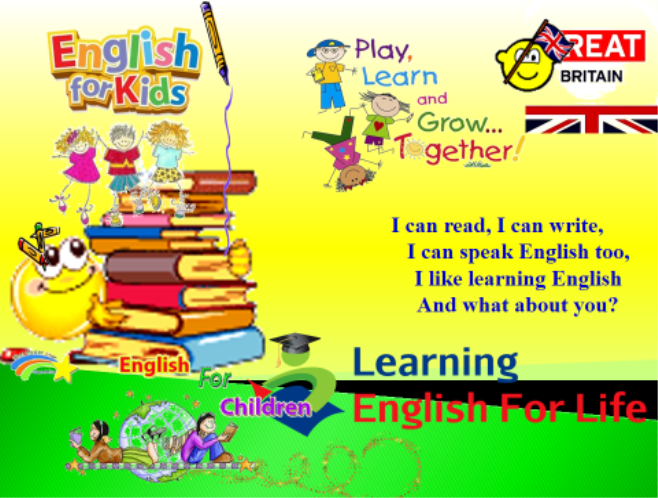
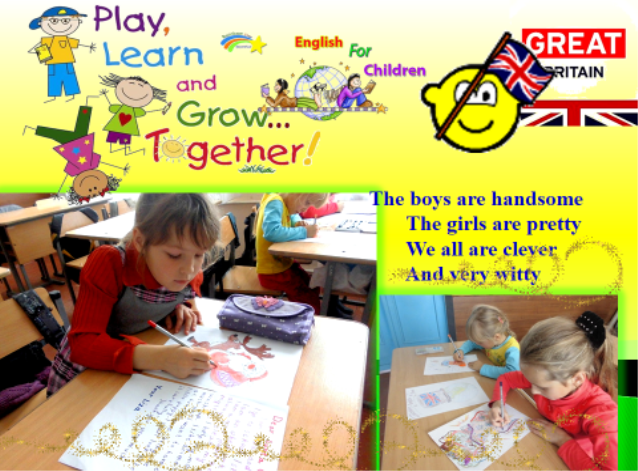
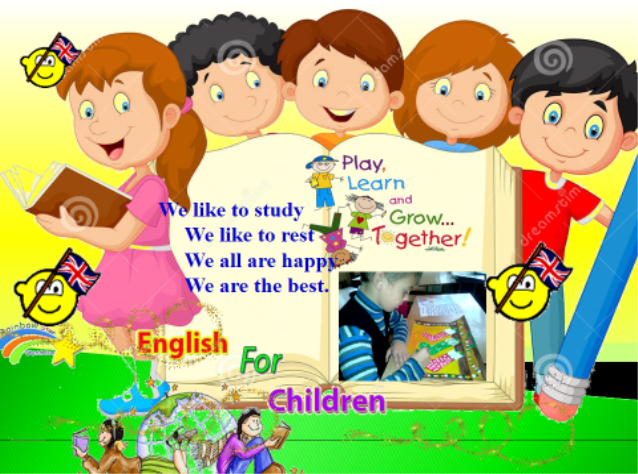
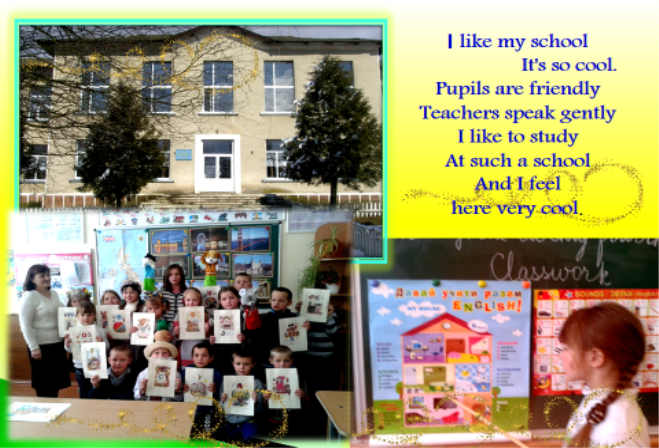
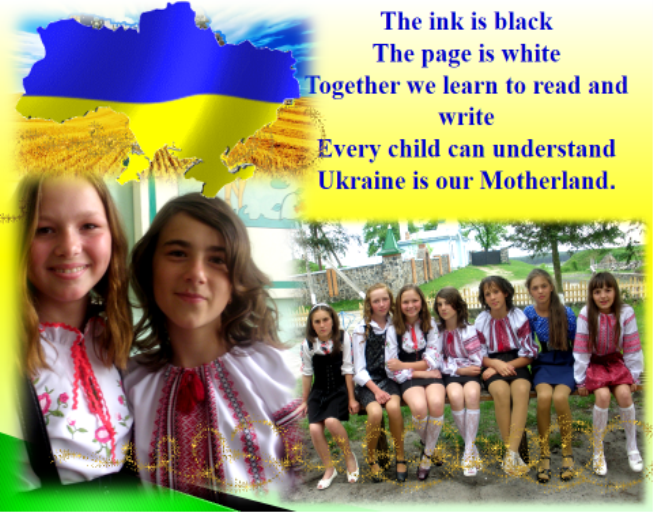

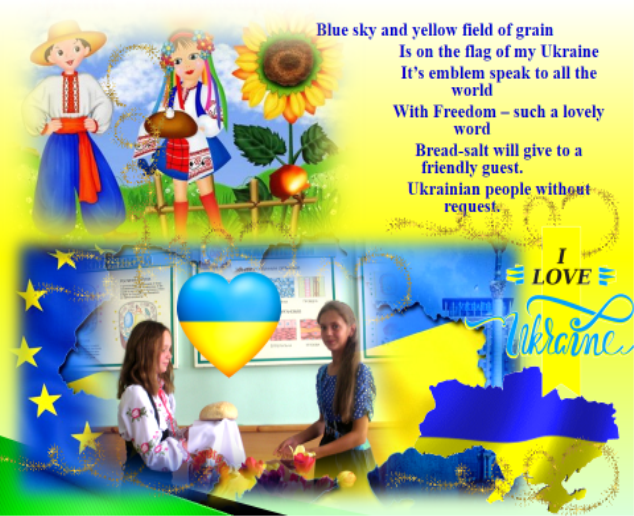
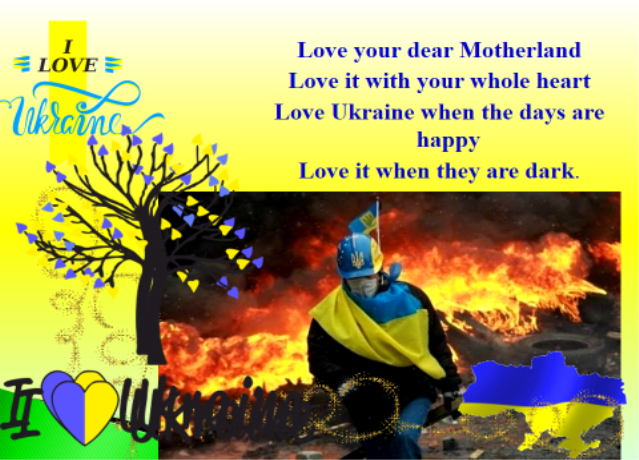
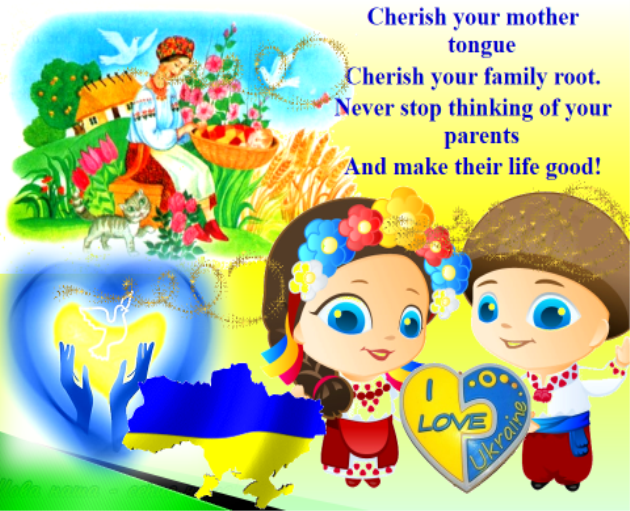
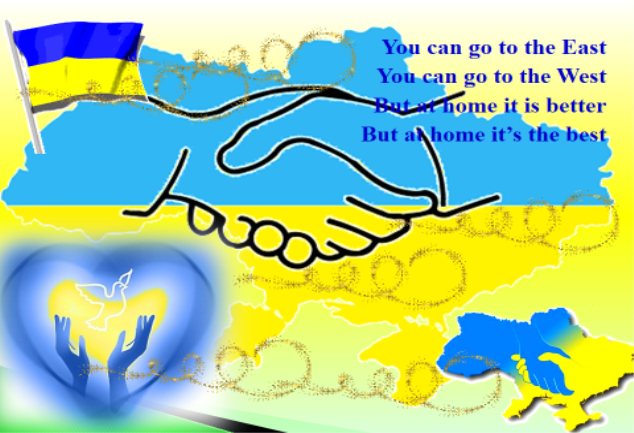
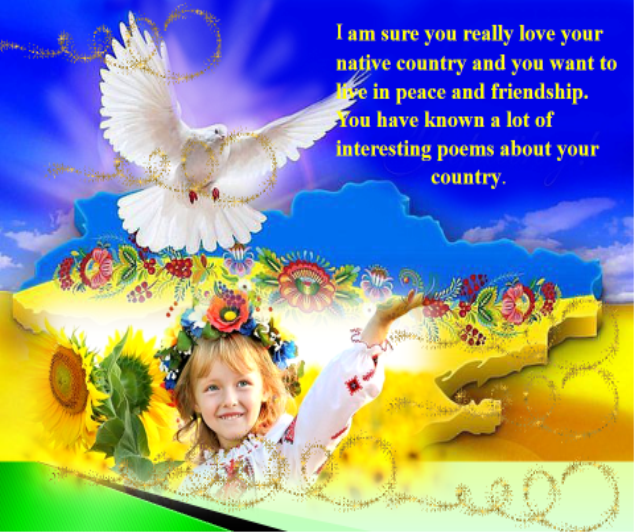
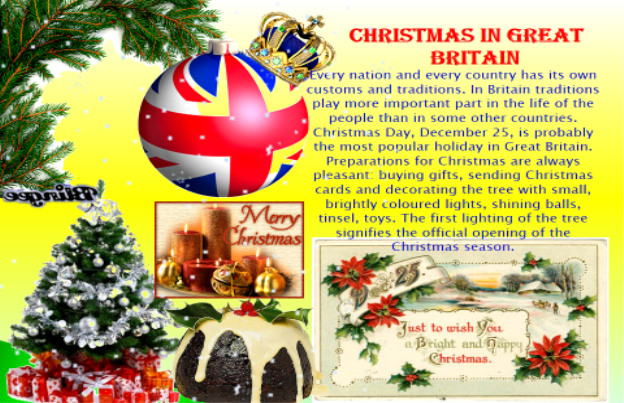
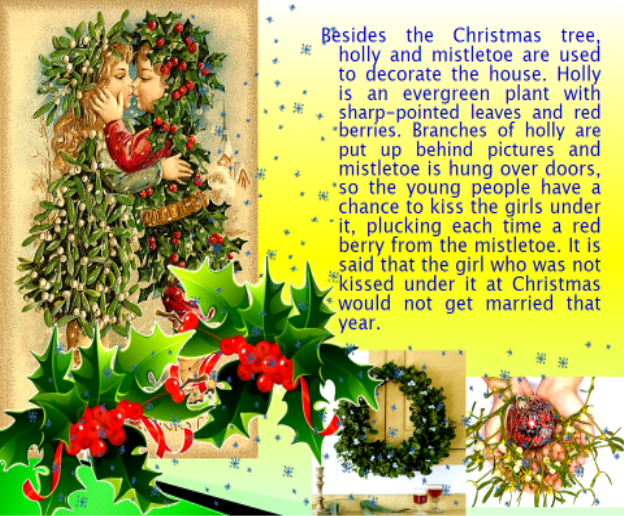
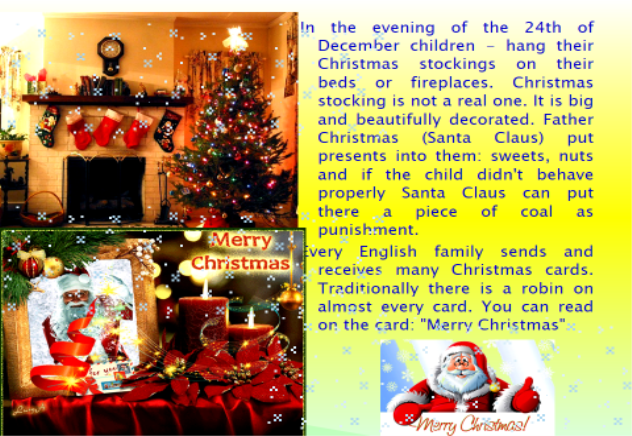
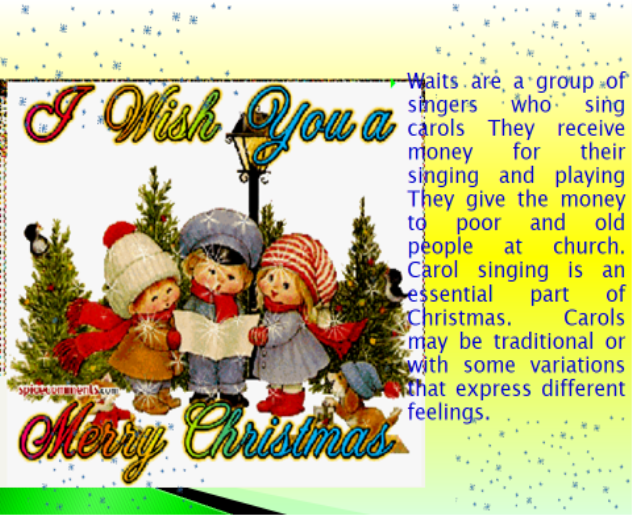
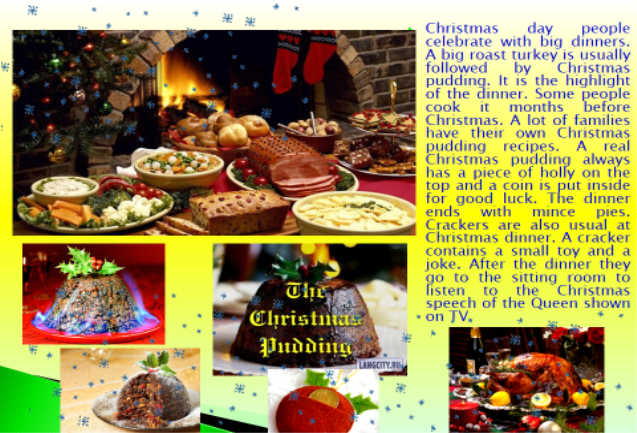
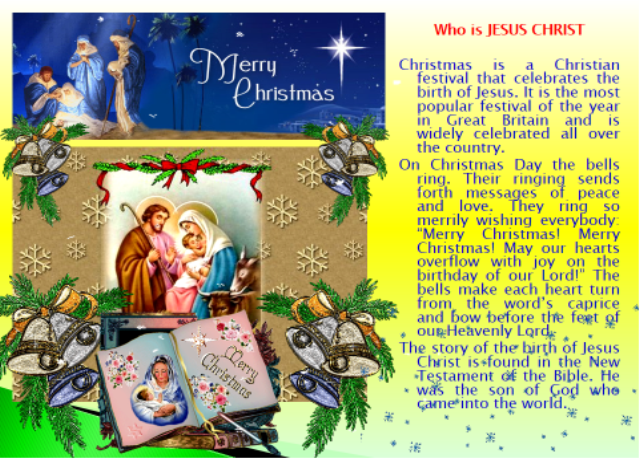
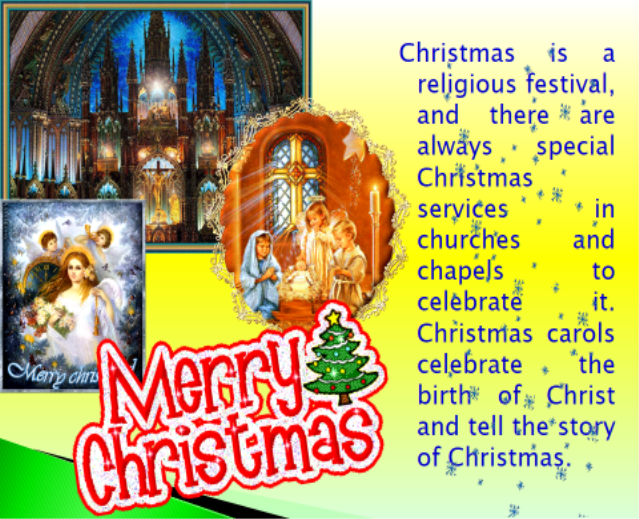

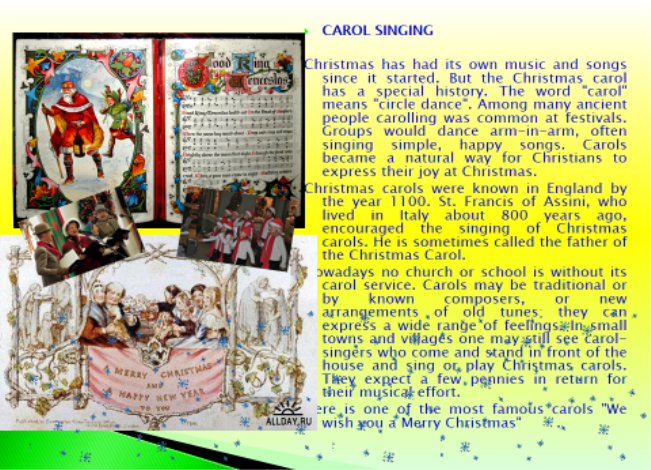
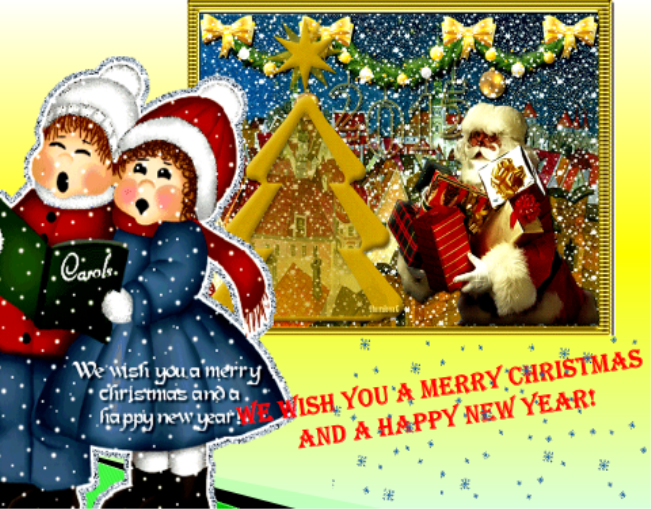
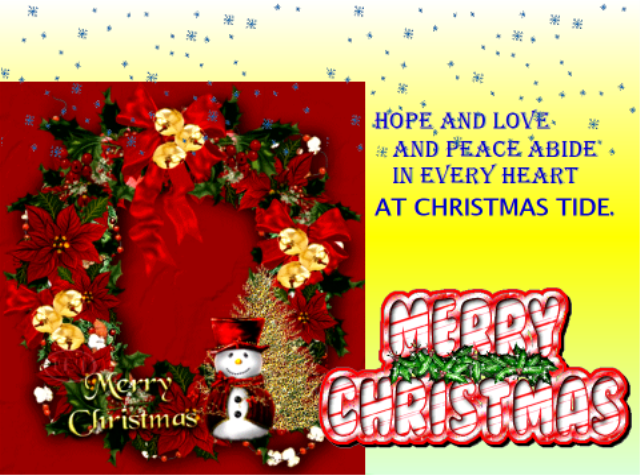
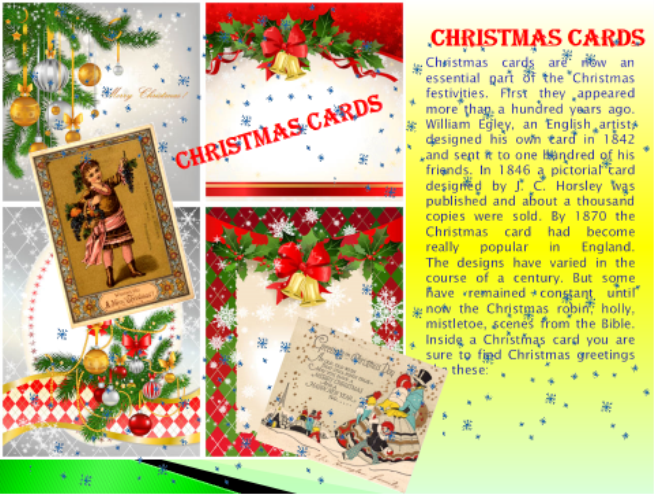
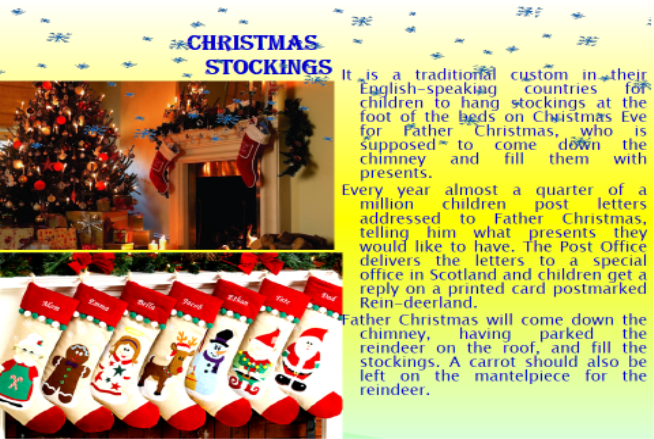
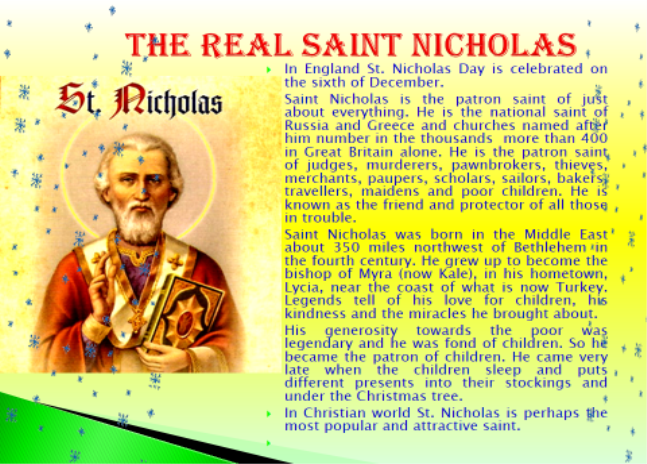
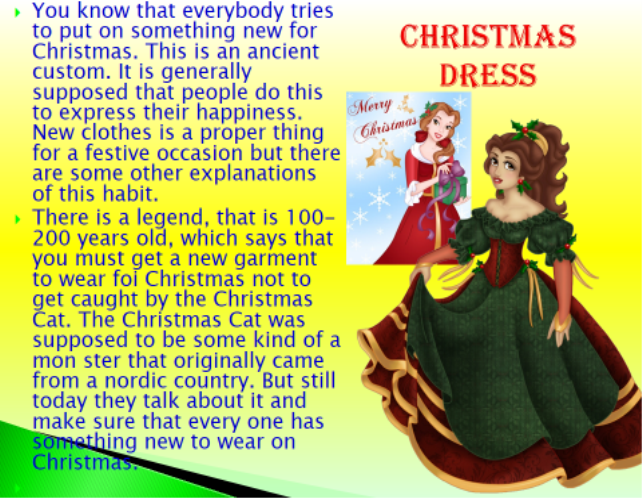
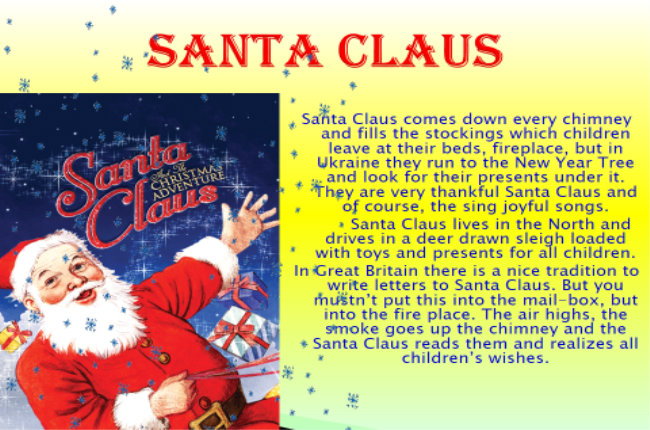
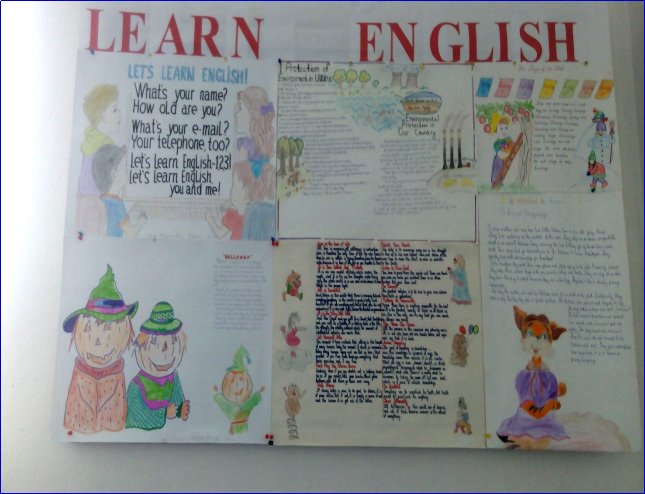
Використані джерела
Бойко Н.П. Cinderella//Англійська мова і література// 2017, -№ 30-с. 544.
Петренко Я.С. Resours for Hollidays//Англійська мова та література// 2014р, грудень -№34-36.
Christmas Traditions and Customs in Great Britain // Англійська мова і література // 2011, грудень.-№ 34-36 с.332-334 .
Topical Texts. Form 5-9. В.: Kharkiv, 2008.
/1500 нових тем сучасної англійської мови/ 2005, -В.:Донецьк.
Фокіна А.І. British Customs and Traditions //Англійська мова і література// 2017-№1-3 –с.515-517 .
Фарина О.З. English is great Fun// Англійська мова і література // 2017- №30-с. 544 http://interpreaterblog.blogspot.com/2017/10/blog-post.html
1


про публікацію авторської розробки
Додати розробку
